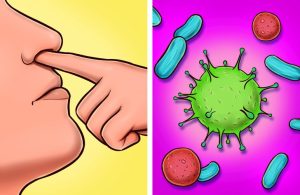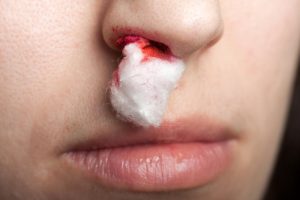Nose picking, a habit practiced discreetly by many, might seem harmless or at worst, a social taboo. However, this common practice carries with it health risks that extend beyond mere social embarrassment.
According to health experts, such as Dr. Job Enema Amodu, an Ear, Nose & Throat [ENT] specialist, Garki Hospital Abuja, the seemingly benign act of picking your nose can lead to a range of adverse health effects.
From introducing infections to damaging the delicate tissues inside the nose, the repercussions of this habit underscore the importance of understanding its potential impacts on health.
 Increased risk of infections
Increased risk of infections
One of the primary concerns associated with nose picking is the increased risk of introducing infections.
The fingers, despite regular washing, harbor bacteria and viruses that can easily be transferred to the nasal passages during the act of picking.
Research by the Mayo Clinic, a nonprofit American academic medical center focused on integrated health care, education, and research, highlights how this transfer can lead to infections such as the common cold or even more serious conditions if pathogenic bacteria are introduced into the bloodstream.
 Damage to nasal tissues
Damage to nasal tissues
The delicate tissues inside the nose can be damaged by frequent or aggressive nose picking. From the research done by African Journals Online, it’s evident that this damage can lead to nosebleeds, sores, and even long-term changes to the nasal structure. The repetitive irritation can cause scarring or thinning of the nasal membranes, making them more susceptible to irritation and bleeding.
Spreading infections
Nose picking not only introduces infections but can also spread them. According to Zahra Rashki Ghalehnoo, assistant professor of Microbiology and Molecular Genetics, Zabol University of Medical Sciences, Iran, pathogens like the flu virus or the bacteria responsible for causing staph infections can be spread from the nose to other surfaces or individuals through the hands after picking.
 Formation of boogers
Formation of boogers
Ironically, the habit of nose picking can contribute to the very problem it often seeks to solve: the formation of boogers.
WebMD, a leader in digital health publishing, explains that nose picking can lead to dryness and irritation in the nasal passages, prompting the body to produce more mucus as a protective response. This increased mucus production can harden into boogers, perpetuating a cycle of picking.
Potential for habitual behavior
Nose picking can become a habitual behavior that’s difficult to break. Behavioral studies, such as those mentioned by Peter L.N. Naish, The Open University (UK), Department of Psychology suggest that repetitive behaviors, especially those that provide a sense of relief or are performed unconsciously, can become ingrained habits over time. This can make cessation challenging and may require conscious effort or even behavioral therapy.
How to stop picking nose
Acknowledge the habit: Recognizing and accepting that nose picking is a habit that needs to be changed is the first step towards modifying the behavior.
Identify triggers: Determine what triggers the nose-picking habit. Common triggers include boredom, stress, or the presence of nasal congestion.
Strategies to stop nose picking
Keep your nose clean: Regularly clean your nose with saline sprays or washes to keep it free from irritants and to reduce the urge to pick.
Use tissue paper: Always use a tissue to clean your nose. This can help prevent the habit of inserting fingers into the nostrils.
Trim your nails regularly: According to Healthline, an American website and provider of health information headquartered in San Francisco, keeping your nails short can make nose picking less appealing and can help reduce the habit over time.
Find alternatives: When you feel the urge to pick your nose, find an alternative action, such as squeezing a stress ball or playing with a fidget spinner.
Cover your fingers: Some people find it helpful to wear gloves or bandages on their fingers to physically prevent picking.
Moisturize the nasal passages: Dryness can lead to irritation and the urge to pick. Use a nasal gel or saline spray to keep the nasal passages moisturized.
Seek professional help: If nose picking is compulsive and difficult to stop, consider seeking help from a healthcare provider or therapist. Behavioral therapy can be effective in treating habitual nose picking.
Creating a positive environment
Educate about hygiene: Understanding the health implications of nose picking, such as spreading germs and risking infections, can motivate change.
Set goals and reward progress: Set achievable goals for reducing nose picking and reward yourself or your child for meeting them.
Using reminders and alarms
• Set periodic reminders on your phone or watch to check if you’re engaging in the habit and to remind you to use alternative strategies.
Engage in mindfulness practices
• Mindfulness and meditation can help increase awareness of one’s actions, including unconscious habits like nose picking.
Conclusion
While nose picking might be dismissed as a trivial or unsanitary habit, its health implications are far-reaching.
From increasing the risk of infections and damaging delicate nasal tissues to spreading pathogens and contributing to the formation of boogers, the reasons to avoid this habit are compelling.
Understanding these risks and adopting healthier alternatives for nasal care, such as using tissues or saline nasal sprays, can help mitigate these health concerns and promote better nasal hygiene.


